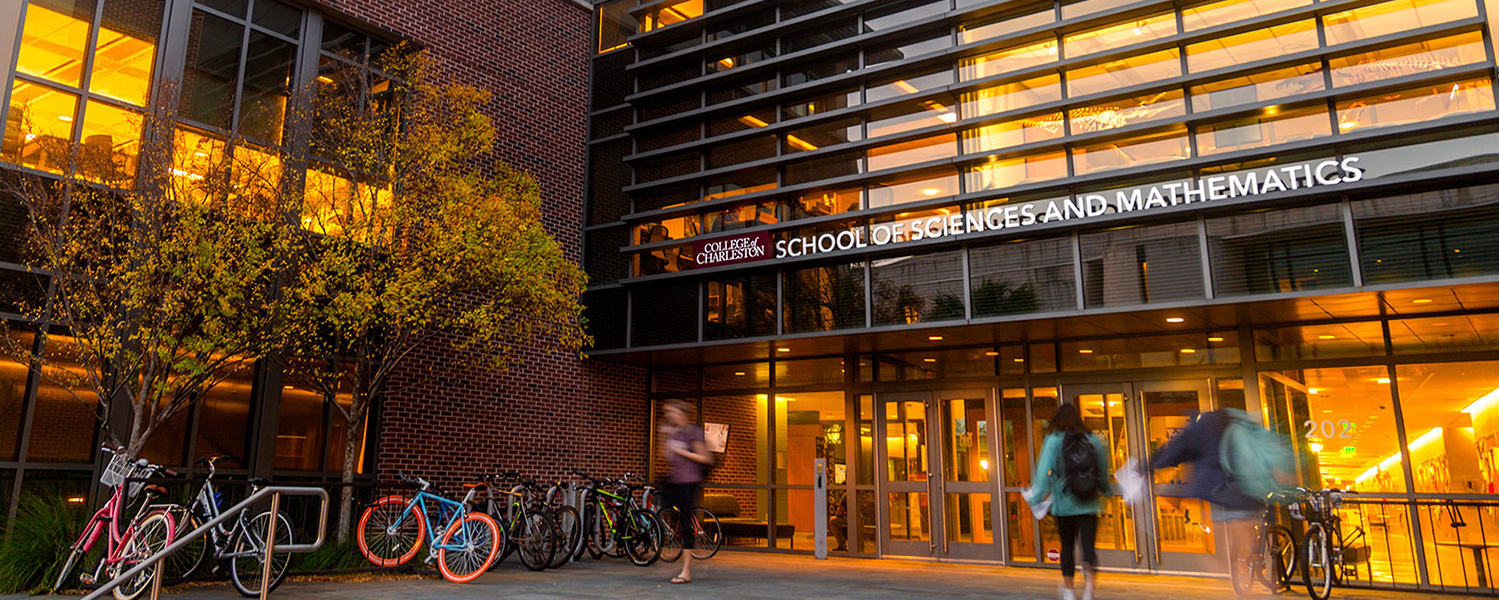About Us

Whether it's our ideal location or the overall excellence of our programs, the School of Natural and Environmental Sciences offers you unparalleled opportunities for success.
Interested in programs like marine biology, life sciences, geology, physics, chemistry, and environmental sciences? These programs benefit from our harbor-side location and the rich biodiversity of the South Carolina Lowcountry. In addition, you'll have opportunities for relevant internships with our community partners in the human-health and industrial sectors.
Tackling hands-on research? At the College of Charleston, you'll work alongside accomplished faculty members conducting cutting-edge research and publishing in international scientific journals. These vibrant academic offerings are consistently recognized for their excellence by the South Carolina Commission for Higher Education.
Faculty Mentors
The School of Natural and Environmental Sciences promotes faculty research and scholarship. Faculty scholarly activities enhance the intellectual environment at the College of Charleston and support its mission by engaging students in inquiry and creative expression.
Faculty are encouraged to involve students in research whenever possible. Independent study and student-faculty research are key methods used in all undergraduate programs to develop intellectual independence, creativity, and an understanding across the science disciplines.
Research helps students connect coursework with real-world applications of their disciplines. The three main goals of the faculty are to:
- stimulate learning,
- convey appreciation and understanding of their disciplines, and
- continue scholarly activities and guide undergraduate research.
Core Commitments
-
Vision
We are a community of teacher-scholars dedicated to fostering an environment of distinction and excellence that supports and nurtures students as scholars, encouraging learning through inquiry within the framework of a broad liberal arts and sciences education.
The School of Natural and Environmental Sciences provides the foundation for both scientific literacy and mathematical numeracy, which are essential components of a broad education for all students.In addition, the school's coursework establishes and emphasizes the depth of disciplinary knowledge as well as connections between and among disciplines.
-
Mission
As our mission, we integrate discovery, innovation and education in order to serve our students, our state and our nation.
The principal responsibility of the School of Natural and Environmental Sciences is to provide science literacy for all students at the College and to equip science majors with the knowledge and skills to pursue careers in a wide variety of fields.
The school's graduate programs in marine biology and environmental and sustainability studies have been carefully selected to complement the undergraduate programs in areas of significant national strength and to meet the intellectual, professional and economic needs of the region and the state.
A key element of our mission is accountability, which includes regular assessments of the effectiveness of the School of Natural and Environmental Sciences' programs. Departments continue to seek opportunities to measure their programs against objective indicators of programmatic quality, such as accreditation reviews and external program evaluations.
-
Department Goals
Science Goals
Our goals in science are to help assure that all graduates of the College of Charleston:
- Can demonstrate an understanding of some of the fundamental scientific concepts and theories about the natural world.
- Acquire knowledge of the evidence, ideas and models that scientists use to make judgments about the natural world.
- Acquire knowledge about science and technology as they shape contemporary experience and values, and demonstrate an appreciation of the historical and contemporary impact of science on daily life.
- Develop the skills of logical and critical thinking necessary to explore how the natural world works.
- Can demonstrate an appreciation and understanding of the scientific method of inquiry.
- Understand that scientific knowledge is based on the outcomes of testing of hypotheses and theories that are under constant scrutiny and subject to revision based on new observations, and such knowledge is not just a collection of facts.
- Can demonstrate an ability to distinguish between science and technology and appreciate the capabilities and limitations of both.
Graduate Goals
Natural and environmental science graduates should have:- The ability to recount and explain the basic facts and postulates of the discipline and to use these in the solution of problems with which the discipline concerns itself.
- Proficiency in the use of the techniques and tools of the discipline.
- An awareness of the resources of the discipline and the ability to seek out and assimilate the knowledge that has not been a part of the classroom experience.
- The ability to relate knowledge in the discipline to other disciplines.